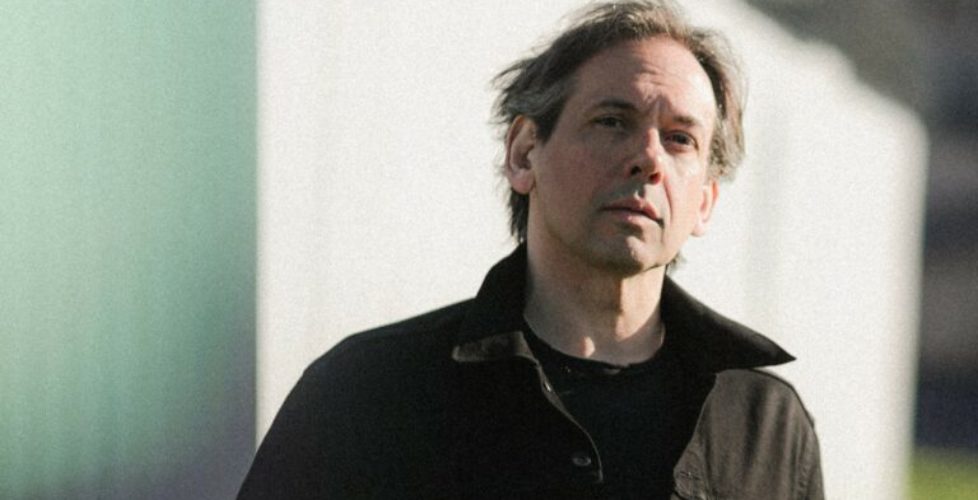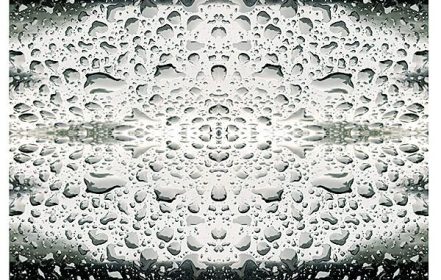Say It With Garage Flowers – ‘Sometimes I just don’t like being around people – even the ones I love…’
Steve Drizos’s new album, the amusingly-entitled i love you now leave me alone, sees the Portland singer-songwriter and producer expanding his sound with a full band, but, like its predecessor, 2021’s well-received and experimental Axiom, it’s still rooted in his love of ’90s alt-rock.
“I like a record that takes me out of reality – I love folk music, but I want to be transported somewhere, so I love the energy of ‘90s rock,” he tells Say It With Garage Flowers.
“I’m loving being a front person in this band – as much as it scares the shit out of me, it’s very gratifying.”
When we last spoke to Portland-based singer-songwriter, engineer and producer, Steve Drizos, it was for the release of his 2021 debut solo album, Axiom – a strong and diverse record that embraced ‘90s alt-rock and psych-folk, and also threw in a trance-like instrumental, female vocal samples, and even a proggy synth solo.
That album, which was written and recorded during the start of the pandemic, saw Drizos experimenting in his SE Portland studio, The Panther, and playing most of the instruments himself.
Now he’s back with the follow-up, i love you now leave me alone, which is even better than its predecessor and, as well as upping the ‘90s alt-rock sound – Radiohead’s The Bends was a key influence – saw Drizos working with a full band: Joe Mengis (Eels/Dancehall Days/Love Gigantic): drums; Tim Murphy (RoughCuts): bass, backing vocals; Todd Wright: electric guitars, backing vocals, and Jenny Conlee (The Decemberists), who just so happens to also be his wife. Drizos sang and played guitars, synths and percussion.
As well as Radiohead, influences this time around included The Afghan Whigs, early Foo Fighters and Mogwai, and Say It With Garage Flowers can also hear a touch of R.E.M, although Drizos assures us that wasn’t intentional.
There’s the crunching, Sugar-like, loud and anthemic power-rock of opener Boomerang; the jangly Americana of Troubled Heart and Katie, the moody and atmospheric ballad Shadow Life; the summery strum of Brooklyn 97202, the widescreen, alt-rock epic Beautiful Nothing, and the naked and honest folk ballad, Inside Outside.
For his day job, Drizos is a producer and engineer – he’s worked with artists including Patterson Hood (Drive-By Truckers), Debbi Peterson (The Bangles), Spencer Tweedy (Tweedy), Chris Funk (The Decemberists), and Scott McCaughey (R.E.M., The Minus 5, The Young Fresh Fellows). He also plays drums for Jerry Joseph and The Jackmormons.
In an exclusive interview over Zoom from The Panther in SE Portland, he tells us why he took a different approach for album number two, how he’s grown in confidence as a singer-songwriter and a performer, and why he loves ‘90s rock…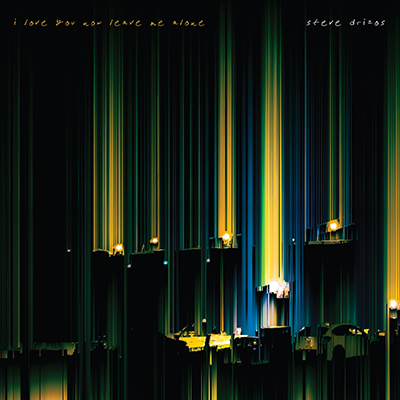
Q&A
Hi Steve. I really like the title of the new album…
Steve Drizos: I’m glad that you enjoy it…
Your first solo album, Axiom, was experimental, and you made it during Covid, largely on your own, but for this one you took a different approach, as it’s more of a full-band record. Why was that?
SD: That’s right. I was really motivated to have more collaborations on this project. I realised with the first record, if I had an idea of what a song or a particular chord change should sound like, it was only going to be as good as that.
When you start collaborating with someone else, that’s when things can start taking a different angle – doors open, and you can start to go in a direction you didn’t expect to. That’s the beauty of collaboration. As much as I loved being insular and the process of working by myself when I was making the first record, with this one there was that element of trading ideas with somebody else in the room.
And, also, with my experience of being a recording engineer, I really noticed the difference in the feel and the energy of making a record when a band is tracking live as opposed to when you’re piecing a record together. I missed that part of it, so that was the motivation.
‘Put a 12-string on anything and you can’t not be compared to R.E.M.’
Did any of the songs change dramatically from the demos to the finished versions?
SD: I don’t think any of the songs drastically changed – I had a strong idea and vision of what the album was going to sound like from the get-go. I wanted people who could play their instruments much better than I could, but I also wanted to add colours and parts to give it a bit more life – I have limited guitar experience and chord vocabulary.
It feels like more of a rock guitar / ‘pop’ album than your first one – there are no squiggly synth solos this time round…
SD: (Laughs) Right…
You’re into your ‘90s rock and that shows on this record. Some of it reminds me of R.E.M…
SD: A couple of people have mentioned that. That’s really interesting – I’m a huge R.E.M. fan but it certainly wasn’t an influence that I was drawing from on this record. Maybe it’s just ingrained in my DNA and it pops up when you don’t expect it…
Your wife’s band, The Decemberists, used to get a lot of R.E.M. comparisons…
SD: Yes, they did – and they continue to. Put a 12-string on anything and you can’t not be compared to R.E.M.
You told me in our last interview that making your first album saved your life – you’d been battling anxiety, depression and addiction. It was an introspective album and a difficult record to make, but it helped you. Lyrically, this album seems to be less about you and more about other people – it deals with family and relationships…
SD: That’s absolutely true. I had the music for the majority of the record finished before I had any of the lyrics done.
I’m learning that it’s a difficult thing to work out what the thread is going to be – for a record to feel cohesive, there’s got to be a loose thread that runs through it. Once you have a ball park or a bullseye to aim for, everything falls into place.
As I was continuing my journey through sobriety and self-realisation, I realised that I am very much an introvert. Maybe I used to mistake that for social anxiety, but sometimes I just don’t like being around people – even the ones I love. I’m blessed to have amazing family and friends, but I get really recharged when I have my alone time – hence the album title.
‘As I was continuing my journey through sobriety, I realised that I am very much an introvert’
I thought it would be an interesting topic and view to investigate, so from there I started to look at my relationships with my friends and, like most people, I have a little bit of judgement when it comes to people around me. I wanted to lean into that and talk about marriage and relationships – and not always the good parts.
I just wanted to be as honest as I could, but, besides the songs about my wife, I didn’t direct a song at any particular person – it was just a composite of a bunch of people in my life.
Did you write Troubled Heart for your wife?
SD: Yes, I did – absolutely.
That’s one of my favourite songs on the record – it has a jangly Americana sound, and I love the twangy, melodic guitar solo…
SD: That’s fair enough – if there was an R.E.M-esque song on the record, that would be the one, for sure.
Boomerang is a big song to start the record with – it doesn’t mess around… It has a ‘90s alt-rock feel…
SD: At the time, I was listening to a lot of early Foo Fighters stuff – especially their first two records. I just love the sound of them and the energy. So, I was aiming for a Foo Fighters-esque sound, and Taylor Hawkins had just died, so I was having a deep dive and revisiting their early back catalogue – even before he was in the band. I wanted to make a real driving, guitar-heavy track to open the record with and get your attention right away.
The first single, Brooklyn 97202, was written about your neighbourhood in SE Portland, wasn’t it?
SD: That’s right.
It came out last summer and it has a summery sound…
SD: Absolutely – the refrain of that song has summer in it quite a bit: ‘The colour’s back and don’t it feel good – summer light in the neighbourhood.’
I don’t necessarily believe in seasonal songs too much, but that one felt like it needed to be cranked up in the summer time, and I wanted to introduce the newer sound of the band, so I was adamant about getting it out months before the record dropped.
Shadow Life stands out – it’s an atmospheric ballad with a touch of ‘90s rock…
SD: I can’t quite recall where that song came from – it has a big bridge with thick guitars, and a soaring outro that’s very derivative – it’s what I love about ‘90s anthemic music. It lives in The Afghan Whigs’ world of creating atmosphere and a vibe. A lot of the songs were written during the pandemic, but I was purposely trying really hard not to have a ‘pandemic’ song – the last thing the world needed was an ‘alone together’ song. There was plenty of those out there…
The idea behind Shadow Life is that it’s about people like me who have had a self-awakening: ‘maybe this way of living is not exactly how I want it to be and here’s an opportunity to change it.’
‘A lot of the songs were written during the pandemic, but I was purposely trying really hard not to have a ‘pandemic’ song – the last thing the world needed was an ‘alone together’ song’
Beautiful Nothing is another atmospheric track, starting slow and very low-key, then building into an epic…
SD: Yeah – the ending was definitely influenced by Mogwai – those records that are big, thick and grungy. It’s two chords over and over again – it feels like a mudslide comin’ atcha!
The album ends with Inside Outside, which is the most stripped-back song on the record – it’s almost folky, and I like the line: ‘Mountains don’t give a fuck if I die…’
SD: (Laughs) Thank you.
Without sounding too much like a hippy, is that song about getting back to nature? It also deals with anxiety and it’s very honest and naked…
SD: It is about getting out to nature when you’re feeling moments of anxiety, but it’s almost the opposite of the hippy idea – it’s not that the trees are resonating with me or know what I’m feeling… When I go out to nature, it’s a very humbling experience – my problems don’t matter, because everything was here long before me and will be here for a long time after… I liked the idea of this pretty, folky melody with lyrics that you wouldn’t expect – ‘the ocean doesn’t give a fuck about me…’
‘I’m loving being a front person in this band – as much as it scares the shit out of me, it’s very gratifying’
Are you pleased with the record? I really liked your debut album, but I think this one is stronger…
SD: I’m extremely proud of this record – more so than my first album because of the collaborations involved. A lot of the things I love about it aren’t my parts – I love the drum tracks and the bass performances. I think the songs are much stronger – the big difference with this record is that with Axiom, I had rough sketches and I built the songs as I was tracking them and recording them, but with this album I sat and wrote all the songs on an acoustic guitar. I made sure that the songs were solid and could stand on their own. I started writing the songs in mid to late 2021 and we started tracking them by fall 2022 – I wanted to get in and capture the moment as soon as possible. I’ve been sitting on the album for a while.
With Axiom, I never intended to go out and play the songs live, but with this album I started entertaining the idea and thinking about how these songs would translate in-front of an audience.
I have a band of amazing players. First and foremost, we’re all friends – we love each other’s company. We like to hang out and play music in the basement. Every single person in the band has said at one point, ‘This reminds me of high school and being in the garage with my first band’ – it has that kind of energy. It’s great. I’m loving being a front person in this band – as much as it scares the shit out of me, it’s very gratifying.
Do you feel you’ve now settled into your role as a singer-songwriter? When we last spoke, you said you were insecure and uncomfortable putting yourself out there. Do you still have imposter syndrome?
SD: I do a little bit, but I certainly feel much more comfortable… I think I was validated with Axiom – the reach of the record went beyond just friends and family. That gave me the confidence to say, ‘OK – maybe I can do this.’ I’ve been writing songs ever since I was a teenager, but I never had the opportunity or the confidence to put them out in-front of people. I am settling into the role quite comfortably now – especially having a few shows under my belt and getting the butterflies out. I’m really leaning into being 50 years old and being a professional musician for 30 years, but doing something that really scares me and that I have to work at. I think it’s a gift and I’m doing the work that I have to do to get better at it.
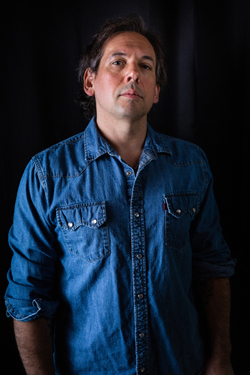
Am I right in thinking you had singing lessons for this album?
SD: It wasn’t so much singing lessons… I worked with a vocal producer called Rebecca Sanborn and she was fantastic – she pushed me out of my comfort zone and into a voice and a range that I didn’t really think that I had. I was comfortable enough with her to take a chance and not be afraid or embarrassed. It didn’t sound very beautiful coming out of the gates – I’m not so sure it still sounds beautiful – but there’s an energy to it. She encouraged me to go for it and I think it really makes a difference on this record. I feel like the energy of my vocal performance matches the energy of the band, which is all I could ask for.
What’s the appeal of ‘90s rock to you? You’re a similar age to me – I turn 50 in March this year. Is it a nostalgia thing for people our age?
SD: People have asked me that question, so I spent some time analysing it: ‘Why am I drawn to it? Is it just nostalgia for that time in my life?’
‘The Bends was a huge influence that I kept going back to – it’s the most perfect record you could ever ask for’
It’s partly that, but when you put on those records, it’s coming out of the ‘80s production style, when everything was larger than life. The ‘90s still had a bit of that – drums were big and a little bit unnatural sounding, and guitars were layered… I like a record that takes me out of reality – I love folk music, but I want to be transported somewhere, so I love the energy of ‘90s rock.
I enjoyed a lot of the grunge bands, but for this record, The Bends [Radiohead] was a huge influence that I kept going back to – from beginning to end, it’s the most perfect record you could ever ask for.
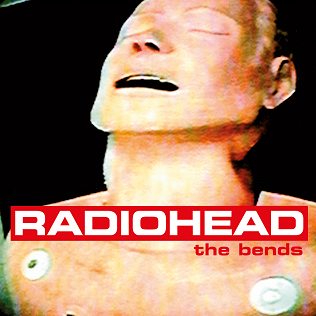
SD: It’s my favourite too. Every single song is fantastic – it’s before things got a little weird… I love it. I also like some of the early Gomez records, like Bring It On and Liquid Skin – I love that production style. It brings in samples and those kinds of elements. I like the early Fatboy Slim records too – they’re pretty rock ‘n’ roll. Those drums are massive!
Would you like to play shows in the UK and Europe?
SD: I would absolutely consider it but the reality is that it’s extremely expensive. It’s even hard in the States – playing with Jerry Joseph, who’s been an established artist for 30 years… For the bands that are playing 500-seat venues or less, it’s getting really hard to go out and make money. The price of everything else is going up, but the guarantees aren’t… As much as I would love to go to Europe, financially, it’s extremely difficult.
Is the Portland music scene healthy?
SD: It seems like it is. Embarrassingly, I’m not super in-tune with some of the younger bands, but there’s a fairly new band called Glitterfox that are fantastic – they’re really taking off right now. People are going out and supporting local bands – it’s not quite what it used to be, but it’s getting pretty darn close. Portland is a really special place – it’s not just music fans, but also the music community that goes out to support each other, which is a pretty rare thing in bigger music markets.
‘People are going out and supporting local bands – it’s not quite what it used to be, but it’s pretty darn close’
So, it’s bounced back after the pandemic?
SD: Fortunately, we didn’t lose too many music venues – besides the big arenas, we don’t have any Live Nation venues… All the 200-500 [capacity] venues are independent, they fought really hard to get government funding, and the community supported them through the pandemic. It was time for the people of Portland to say, ‘This is important’, and they showed up for it.
Thanks for talking to me – I think the new album has a wider appeal than the first one, and it will be a word-of-mouth record that people get into…
SD: That’s so wonderful to hear – it would be a dream come true. I’ve put it out there and after that, it’s out of my control.
i love you now leave me alone is out now on Cavity Search Records.

